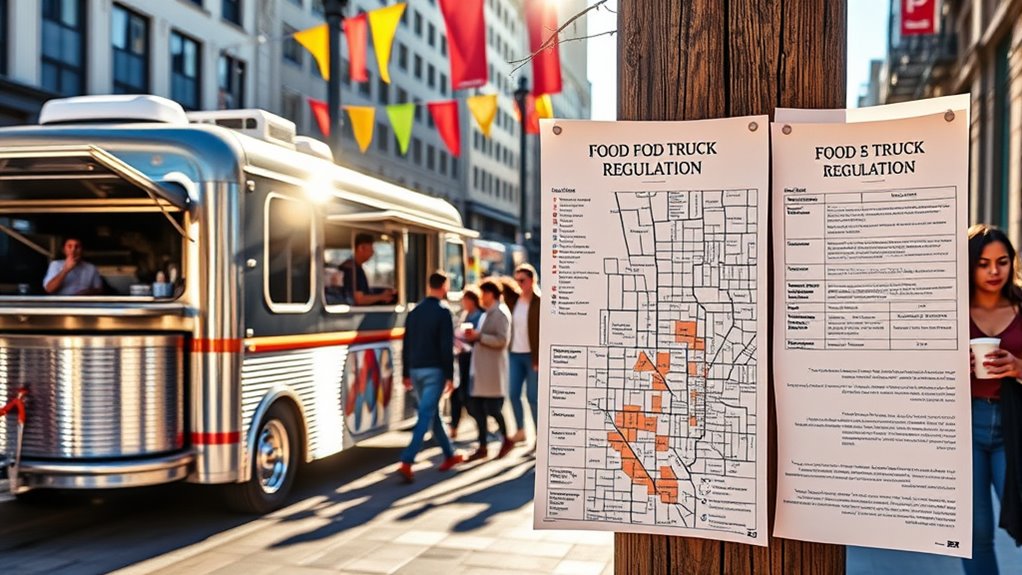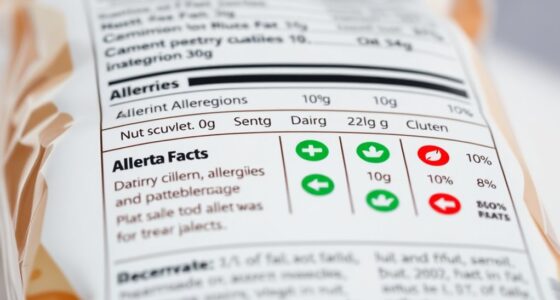To understand your state’s food truck regulations, you’ll need to research local permitting, licensing, and compliance steps. This includes health and safety standards, vehicle registration, zoning laws, and parking restrictions. You should also verify food handler certifications, equipment standards, waste management, and insurance requirements. Staying organized and current on regulations helps avoid fines and legal issues. If you keep exploring, you’ll discover detailed guidelines to make sure your food truck operates smoothly and legally.
Key Takeaways
- Research state-specific licensing, permitting, and vehicle registration requirements before starting operations.
- Comply with local health and safety standards for food storage, sanitation, and equipment maintenance.
- Obtain necessary food handler’s permits or certifications and stay updated with ongoing training.
- Understand zoning, parking restrictions, and designated areas for food truck operation to avoid violations.
- Follow waste disposal regulations and maintain proper insurance coverage to ensure legal and safe business practices.
Overview of State Food Truck Permitting Processes
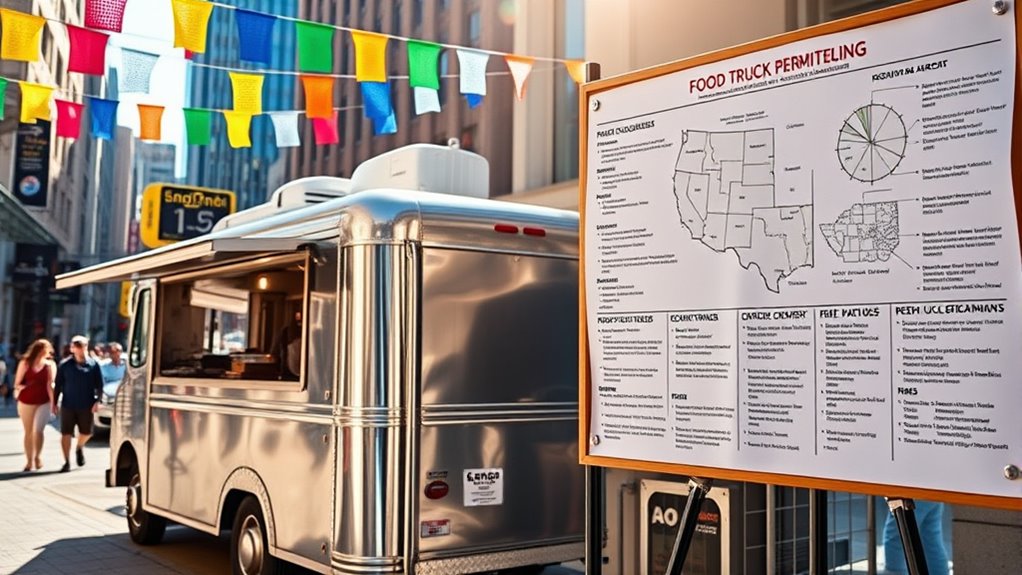
Have you ever wondered what it takes to get a food truck up and running legally? The permitting process varies by state, but understanding the basics is essential. You’ll typically start by submitting an application that includes your food truck branding and intended menu. State agencies review your plans to ensure compliance with local health and safety standards. Some states require a food handler’s permit or a mobile food vendor license. While maneuvering permits, think about your marketing strategies; a strong brand can help you stand out during inspections and customer interactions. Keep in mind that each state may have unique requirements, so researching your specific state’s regulations is crucial. Proper permitting ensures you operate legally and build a solid foundation for your food truck business. Additionally, understanding food safety standards can help prevent violations and ensure customer trust.
Health and Safety Inspection Requirements
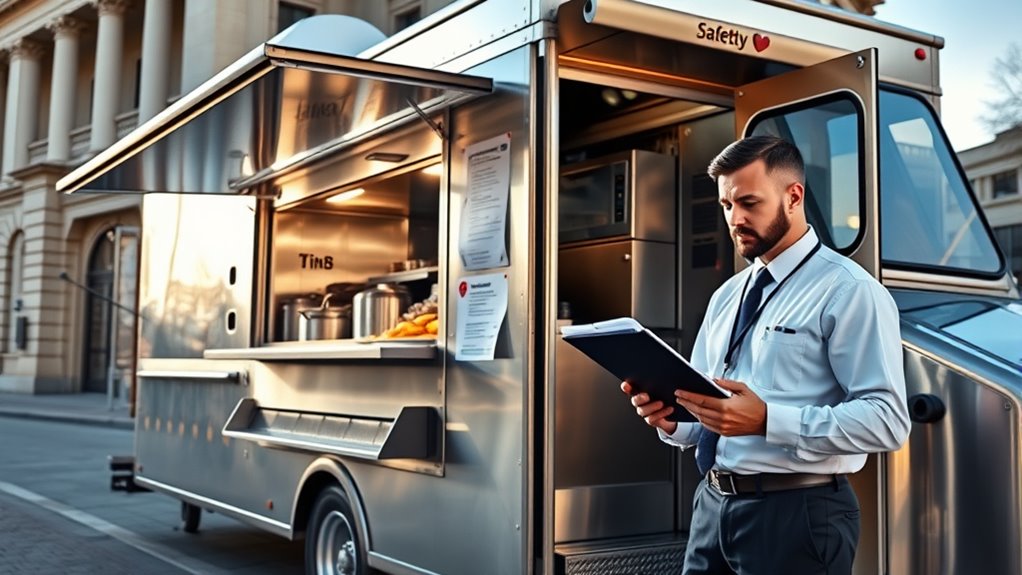
When your food truck undergoes health and safety inspections, you’ll need to follow proper procedures to guarantee everything meets local standards. You must demonstrate compliance with health codes, from food storage to sanitation practices. Staying prepared helps you pass inspections smoothly and keeps your operation running without issues. Utilizing proper planning can help ensure all aspects of your food safety measures are addressed beforehand.
Proper Inspection Procedures
What steps should you follow to guarantee your food truck passes health and safety inspections? First, review the inspection checklist provided by your local health department to understand each requirement. Ensure your truck meets all safety protocols, such as proper food storage, sanitation, and equipment maintenance. Regularly conduct internal audits to identify and fix potential issues before the official inspection. Keep detailed records of cleaning schedules, temperature logs, and maintenance activities. Train your staff thoroughly on safety procedures and proper food handling. Prioritize cleanliness and organization inside your truck, making sure everything is accessible for inspectors. Conducting regular equipment maintenance helps prevent malfunctions during inspections and demonstrates your commitment to safety. Following these steps helps you demonstrate compliance confidently and increases the likelihood of passing your health and safety inspection smoothly.
Health Code Compliance
Ensuring your food truck complies with health codes is essential for passing inspections and operating legally. You need to prioritize food safety by following sanitation standards that prevent contamination and illness. Regularly clean and sanitize all surfaces, utensils, and equipment to meet regulatory requirements. Maintain proper food storage temperatures to keep ingredients fresh and safe. Confirm your water supply and waste disposal systems are up to code, preventing unsafe conditions. Keep detailed records of cleaning schedules and food safety protocols, showing inspectors your commitment to sanitation standards. Conduct internal audits to identify and address potential violations before inspections. Staying informed about your state’s specific health code regulations helps you avoid penalties and keeps your operation running smoothly. Maintaining proper sanitation practices is crucial for ongoing compliance and customer safety. Prioritize health code compliance to protect your customers and your business.
Food Handler Certification and Training Standards

Obtaining proper food handler certification is a crucial step in meeting food safety standards for food trucks. This certification confirms you understand essential food safety practices and comply with training standards set by your state. It’s not just a requirement; it’s a commitment to your customers’ health and your reputation. Proper training helps prevent contamination, illness, and legal issues. Keep in mind, some states require ongoing education or refresher courses to maintain your certification. Emphasizing food safety practices can enhance customer trust and operational success.
Vehicle Licensing and Registration Regulations
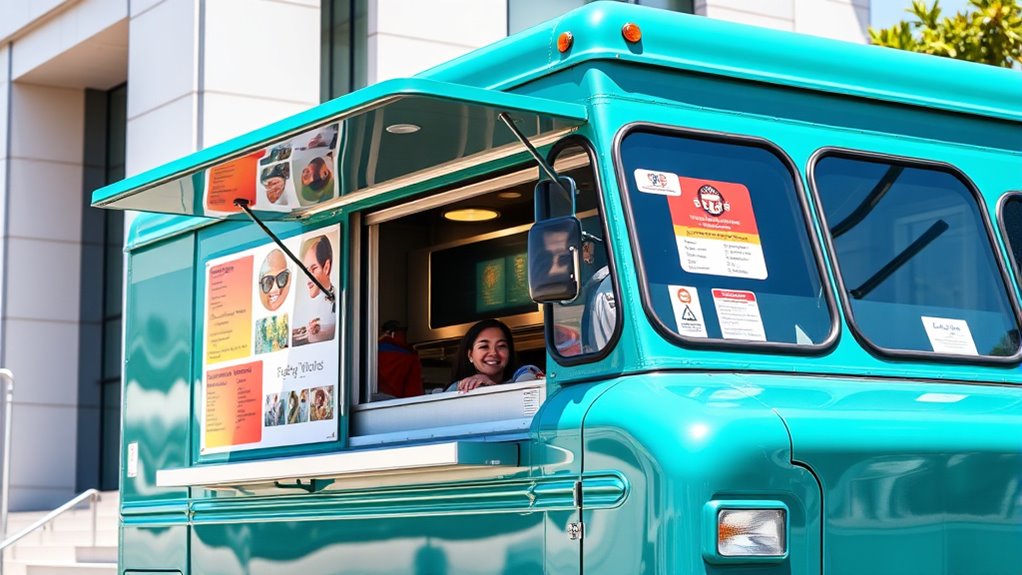
Getting your food truck licensed and registered is a vital step you can’t overlook. You’ll need to understand the licensing process, gather the required documents, and stay on top of renewal rules. Keeping everything in compliance ensures your truck operates smoothly and avoids potential fines. Additionally, understanding vehicle licensing and registration regulations specific to your state is essential for legal operation.
Vehicle Licensing Processes
Have you wondered how to navigate the vehicle licensing process for your food truck? It’s essential to understand the steps involved to keep your business compliant. First, you’ll need to register your vehicle with the state, ensuring all paperwork is complete and fees are paid. Then, keep track of license renewal deadlines so your license remains valid, avoiding fines or penalties. Be prepared to submit proof of insurance and safety inspections when required. Additionally, some states may require periodic vehicle registration updates or emissions testing. Staying organized and aware of deadlines will help you avoid disruptions. Recognizing Angel Number Soulmate signs can also serve as a metaphor for paying attention to important details in your licensing journey. Knowing the process allows you to focus on your business rather than bureaucratic hurdles, ensuring your food truck runs smoothly and legally.
Registration Document Requirements
To register your food truck properly, you must gather and submit specific documents that verify ownership, safety, and compliance. This includes providing your food truck permits, which confirm you meet local health and safety standards. You’ll also need registration documentation, such as the title or proof of purchase, showing you legally own the vehicle. Some states require a vehicle inspection report to ensure your truck meets safety regulations. Additionally, you might need to submit insurance certificates and a valid driver’s license. Make sure all documents are current and accurate to avoid delays. Proper documentation is essential for legal operation and avoiding penalties. Ensuring your vehicle meets safety standards, such as those established through industrial juice manufacturing processes, can help facilitate smoother registration procedures.
Renewal and Compliance Rules
Are you aware of the specific rules for renewing your vehicle registration and maintaining compliance? Staying on top of renewal procedures and compliance deadlines is essential to avoid penalties. You’ll need to submit renewal applications on time, provide updated documentation if required, and pay any applicable fees. Missing deadlines can lead to fines or suspension of your vehicle’s registration. Keep track of renewal notices sent by your state’s DMV or licensing agency. Some jurisdictions allow online renewals, making the process easier. Regularly review your compliance obligations to ensure your food truck remains legally operational. Additionally, understanding vehicle licensing laws**** can help prevent unexpected legal issues. Failure to adhere to these rules can disrupt your business and lead to unnecessary expenses. Staying organized and proactive helps you meet renewal deadlines and stay compliant with vehicle licensing laws.
Zoning Laws and Parking Restrictions
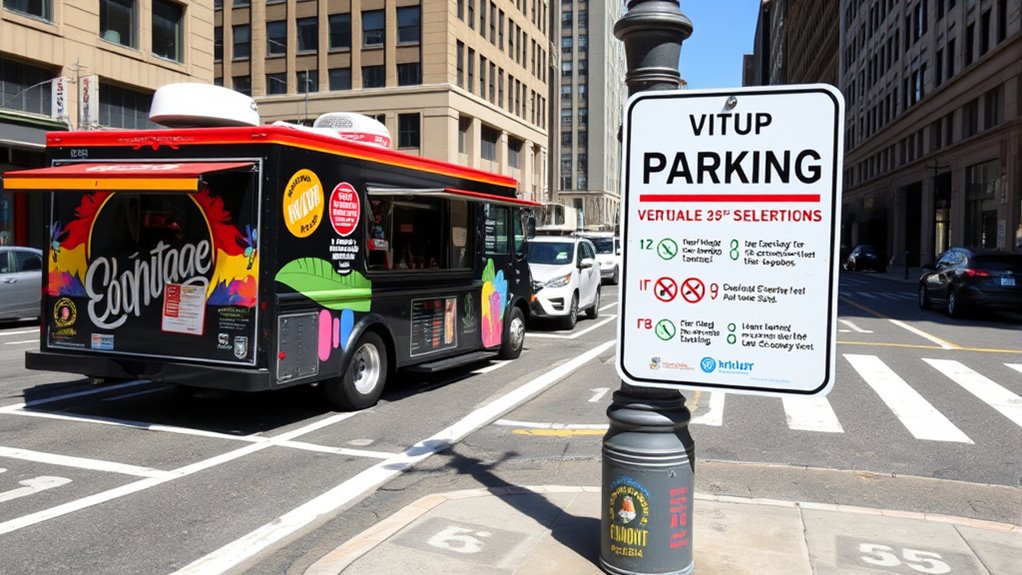
Zoning laws and parking restrictions play a crucial role in determining where food trucks can operate legally. These regulations specify which areas are designated for commercial activity and often restrict parking in certain zones, like residential neighborhoods or protected districts. You need to review local zoning laws to identify acceptable locations for your food truck. Parking restrictions may limit the hours or duration you can park in a specific spot, preventing overcrowding or obstruction. Violating these rules can lead to fines or ticketing, so it’s essential to understand the specific zoning and parking regulations in your area. By complying with these laws, you ensure your food truck operates smoothly and avoids legal issues. Keep updated on local ordinances to stay within legal boundaries.
Equipment and Food Storage Compliance
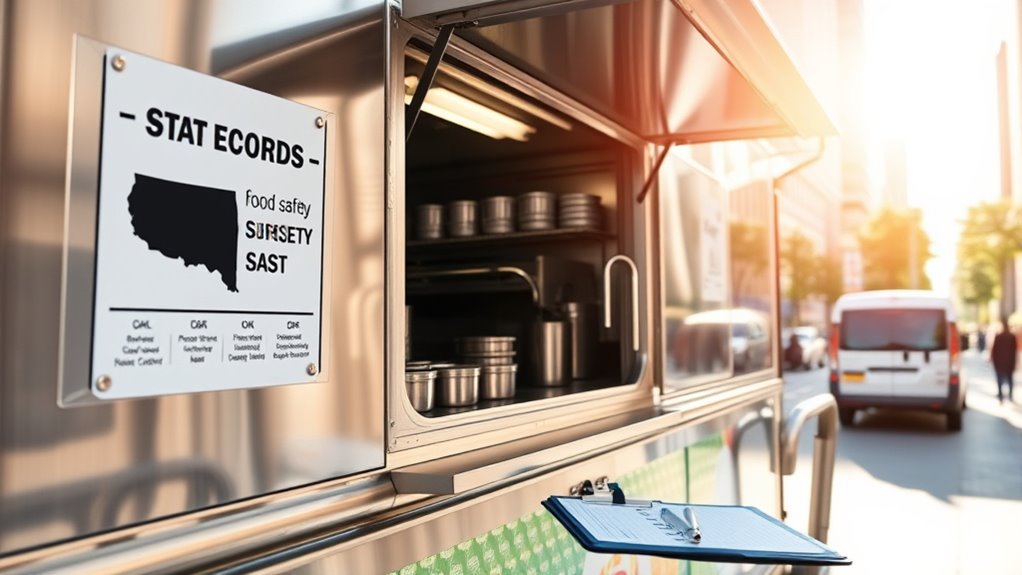
Maintaining proper equipment and food storage standards is essential for ensuring safety and compliance in your food truck operations. Proper food storage prevents contamination and spoilage, while regular equipment maintenance keeps your truck running smoothly and meets health regulations. To stay compliant, you must adhere to specific guidelines for storing ingredients, keeping cold and hot foods at correct temperatures, and maintaining sanitation standards. Neglecting these can lead to violations, fines, or closures. Ensure your refrigeration units are functioning properly, regularly clean all surfaces, and store food off the ground. Proper storage and maintenance practices protect your customers and your business. Additionally, understanding the best appliances for home game rooms can help you optimize your space and equipment for efficiency. Remember, consistent adherence to these standards is key to avoiding issues with health inspectors and ensuring a safe, successful operation.
Waste Disposal and Sanitation Guidelines

Effective waste disposal and sanitation are crucial for keeping your food truck clean, safe, and compliant with health regulations. Proper waste management involves promptly removing trash and ensuring containers are sealed to prevent leaks or odors. You must follow sanitation standards that require regular cleaning of all food contact surfaces, sinks, and waste areas to prevent contamination. Use approved cleaning agents and disinfectants, and keep waste bins away from food prep zones. Proper disposal of grease and wastewater is essential to avoid clogs and environmental violations. Always adhere to your state’s specific guidelines for waste management, including the correct storage, transport, and disposal methods. Maintaining high sanitation standards protects your customers’ health and ensures your food truck remains compliant with local health codes. Additionally, understanding proper waste handling procedures helps prevent health hazards and legal issues.
Insurance and Liability Coverage Necessities
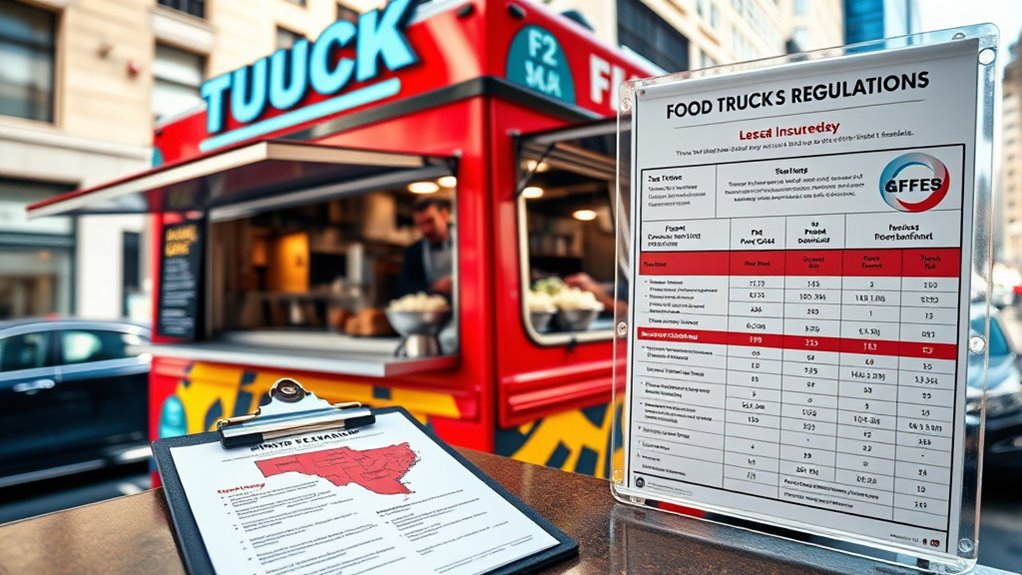
Securing the right insurance coverage is essential to protect your food truck business from potential liabilities. Meeting insurance requirements guarantees you’re covered against accidents, property damage, or customer injuries. Liability coverage, in particular, shields you from costly legal claims. Without proper insurance, a single incident could jeopardize your entire operation. To stay compliant, you should understand the specific insurance requirements in your state and industry standards. Additionally, understanding how essential oils for various health issues can impact health and safety protocols is important when considering overall business liability.
Protect your food truck with proper insurance to cover liabilities and stay compliant.
Having extensive insurance safeguards your business and gives you peace of mind as you serve your community.
Local Regulations and Additional Permits

Before hitting the streets, you need to navigate various local regulations and obtain the necessary permits to operate legally. Local permits are essential, and requirements vary by city or county. Be sure to check signage regulations, which dictate how you can advertise your truck’s menu and branding. Failure to comply can lead to fines or shutdowns. To help, here’s a quick overview:
| Regulation Type | Key Details |
|---|---|
| Local Permits | Vary by location; may include health, fire, and business licenses |
| Signage Regulations | Restrictions on size, placement, and content |
| Parking Permits | Needed for specific locations or zones |
| Health Permits | Required for food preparation and service |
| Additional Permits | Special event or street closure permits |
Staying informed about regulatory compliance can help guarantee smooth operations.
Frequently Asked Questions
How Often Do Food Truck Permits Need Renewal?
You need to check your local regulations to find out how often your food truck permit renewal is due, as it varies by location. Typically, the renewal process involves submitting a renewal application and paying any applicable fees before your permit expires. Staying on top of your permit renewal guarantees your food truck remains compliant and operational. Keep track of renewal deadlines so you avoid any penalties or service interruptions.
Are There Restrictions on Menu Types or Ingredients?
Think of your food truck menu as a passport—some countries restrict ingredients, just like menu restrictions vary by state. You might face ingredient limitations, like avoiding certain allergens or restricted items. For example, one city bans fried foods in trucks. Check your local regulations to make sure your menu complies with restrictions on ingredients and menu types, avoiding fines or shutdowns. Always stay updated to keep your culinary journey smooth.
Can I Operate a Food Truck in Multiple Cities?
You can operate a food truck in multiple cities, but you’ll need to plan your mobile vending carefully. Each city might have different permits, health codes, and parking rules, so route planning becomes essential. You should research local regulations beforehand, obtain necessary permits, and stay compliant. This way, you can smoothly expand your business across various locations without legal issues or disruptions.
What Are the Requirements for Signage and Branding?
When it comes to food truck branding, you need to follow signage regulations that specify size, placement, and content. Your signage should be clear, visible, and compliant with local rules to avoid fines or permits issues. Make sure your branding is professional and consistent with your business identity. Check with local authorities for specific signage regulations, as requirements can vary by city or state to guarantee your food truck stands out legally and attractively.
How Do I Handle Compliance During Special Events or Festivals?
When handling compliance during special events or festivals, you need to obtain the proper event permits and coordinate with event organizers to make certain you’re following all regulations. Make sure your food truck meets health and safety standards specific to the event. Stay proactive by communicating with vendors and festival staff, and keep all necessary documentation handy. This approach helps you avoid penalties and makes your participation smooth and successful.
Conclusion
By mastering your state’s food truck regulations, you’ll navigate nuances with confidence. Clear codes, compliant containers, and consistent cleanliness create a compelling culinary cart. As you adhere to permits, policies, and parking, you’ll pave the path to prosperous profits. Embrace the essential essentials—inspections, inspections, and inspections—and transform your tasty travels into a trusted, thriving venture. With diligent diligence and dedication, your food truck journey becomes a flavorful, flourishing favorite for all to follow.
